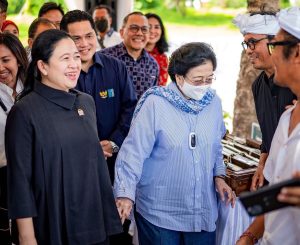Indonesia’s most powerful female politician may no longer be the country’s president – but many have accused her of still acting like one.
In a recent speech in Jakarta commemorating the 50th anniversary of the Indonesian Democratic Party of Struggle (PDI-P), the political party she has chaired for the last 24 years, 75-year-old Megawati Sukarnoputri stunned Indonesian netizens who took to social media to express their disapproval of the “boastful” tone of her speech.
The eldest daughter to Indonesia’s first president, Sukarno, Megawati served as president from 2001 and 2004, when she lost power in the country’s first direct presidential election.
After two more elections in which she unsuccessfully opposed Susilo Bambang Yudhoyono, she switched to the role of kingmaker by backing a popular candidate from her own party, Joko Widodo, better known as Jokowi, in 2014.
Jokowi went on to win two successive presidential elections. His two-term limit ends with the presidential election scheduled for February 2024. Jokowi is the first civilian president to lack the advantage of leading his own political party.
Megawati’s relationship with Jokowi was one of the issues which came under scrutiny in the wake of her speech. Detractors have criticized her for disrespecting the president by suggesting that she was the power behind the throne. At one point during her speech, she jeeringly told her audience while pointing at the president seated in the front row, “Poor Jokowi could never have got there without PDI-P!”
Though couched in undiplomatic banter, it is hard to deny the truth of this statement. Jokowi has had to rely on PDI-P to pass legislation throughout his presidency. Megawati also recounted how it was her idea for Jokowi to invite his now vice-president Ma’ruf Amin to join his ticket ahead of the 2019 election.
In freely admitting to having a hand in major political events, Megawati proved that a female ex-president who leads the largest political party can wield power in Indonesia. This is bound to unsettle conservative sensibilities. Boasting about it defies what many Indonesians usually expect of women.
But Megawati was unashamed of her power, and female leadership was a dominant theme in her speech. She made 28 references to women in power during the two-hour address, lamenting what she saw as the recent retreat of Indonesian women from public life.
As the country’s first and only woman president, Megawati was often exposed to sexist prejudice. Her late husband, Taufik Kiemas, was rumored to be governing in her stead, just to emphasize her alleged incompetence.
In the two direct elections in which she was a candidate, her opponents appealed to conservative Islamic values in the world’s largest Muslim-majority nation by preaching against female leadership.
Speaking at a women’s rights seminar in 2018, Megawati complained about how many Indonesian women had failed to show solidarity in her political contests against Yudhoyono.
“After my defeat, I asked a group of women why they hadn’t voted for me. They replied because my opponent was handsome and tall,” she wryly said.
Often described as self-entitled and stubborn to a fault, Megawati’s otherwise unsophisticated image often leads her enemies to underestimate her.
Urban Indonesian netizens also made derisive comments about the “uncouth marketplace lingo” used in her speech.
In a way, they were right. She spoke using informal language, only aided by side notes, and dotted with jocular Javanese expressions. It was indeed the kind of political speech that most Indonesians are unfamiliar with.
Politicians are in the habit of using polite, long-winded language at public speaking engagements, accentuated by the usage of English words. Megawati’s speech, by contrast, was delivered in the crude vernacular that even uneducated rural people would be able to grasp.
If her speech was intended to appeal to her party’s militant base in the hinterlands of Central Java and East Java, where the PDI-P reaped electoral success in the last election, it would have resonated, irrespective of the disapproval of the urban educated classes.
At the same time, Megawati is rightly accused of holding onto power in her party for too long, during which time she has relentlessly quashed potential rivals. At the last party congress in 2019, she was re-elected chairperson as the sole candidate by acclamation.
She also harbors dynastic ambitions for PDI-P, molding it into the party of the Sukarno family. Two of her offspring, daughter Puan Maharani, currently speaker of the House of Representatives, and son Prananda Prabowo, are senior party figures. Maharani’s own children recently made their debut as party functionaries.
Megawati’s political longevity as an ex-president is unprecedented in Indonesia. Yet, at the peak of her power and influence, she now stands at a crossroads.
Maharani, her preferred political heir and presidential candidate for the 2024 presidential election, consistently trails in public polls, bested by Central Java Governor Ganjar Pranowo.
Will she bow to public opinion, or will she stubbornly chart her course to ensure the political survival of her dynasty, and perhaps, a possible encore for female leadership in Indonesia?

































